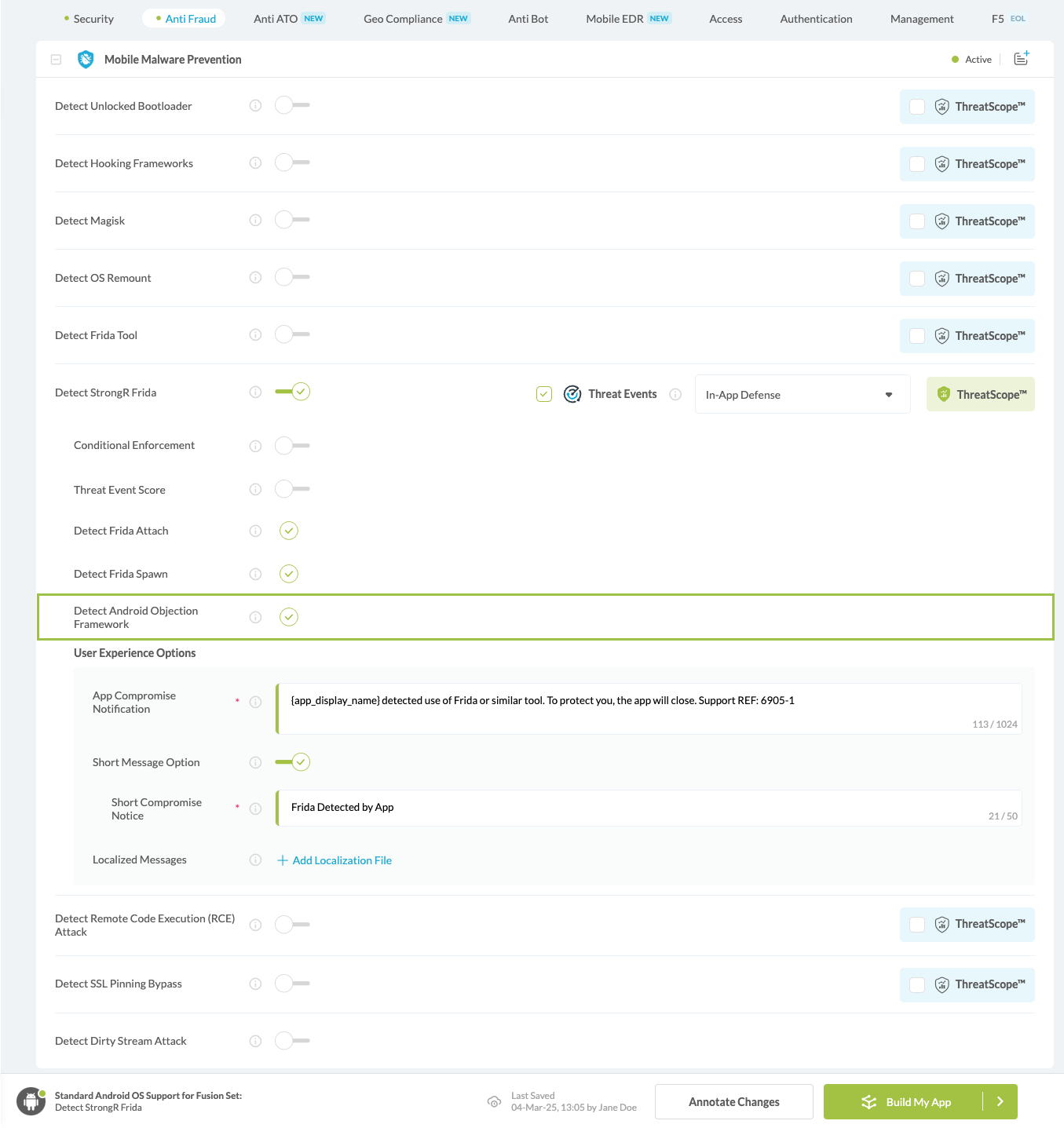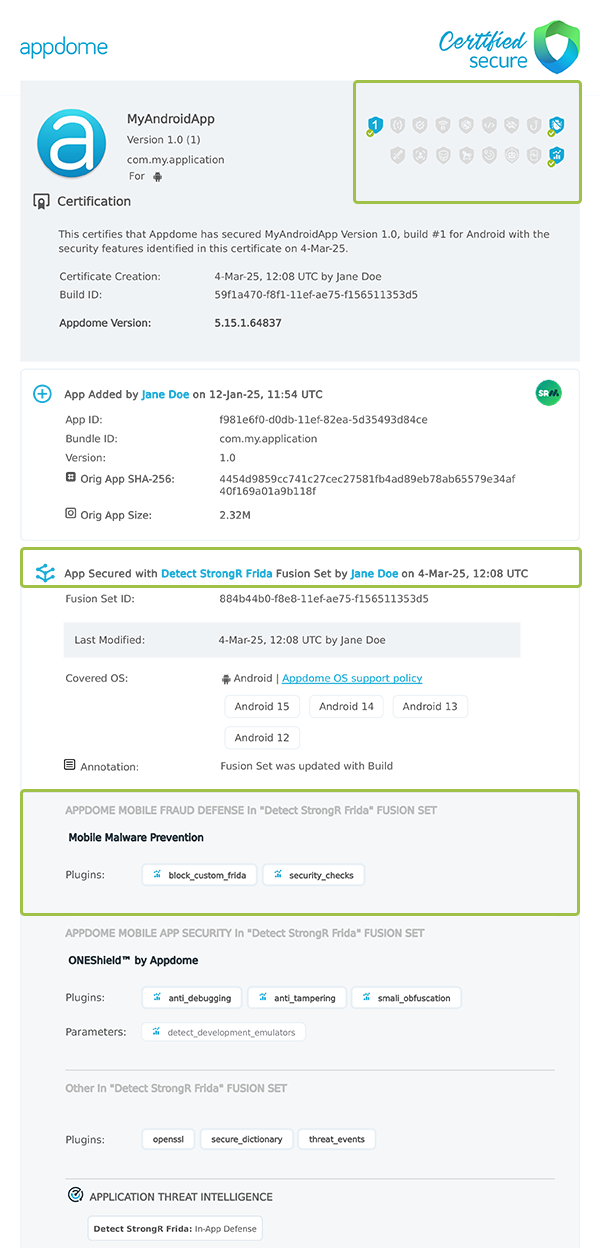How to Detect Android Objection Framework in Mobile Apps Using AI
This Knowledge Base article describes how to use Appdome’s AI/ML in your CI/CD pipeline to continuously deliver plugins that Detect Android Objection Framework in Android apps.
What is Objection Framework?
The Objection Framework is a runtime mobile security assessment toolkit designed to simplify penetration testing and security analysis for Android and iOS applications. It is built on top of the Frida dynamic instrumentation toolkit and provides a user-friendly interface to interact with and manipulate apps during runtime without requiring reverse engineering.
Key Features of the Objection Framework:
- Simplified Runtime Manipulation: Allows testers to bypass security controls, explore app functionality, and extract sensitive data at runtime without modifying the app binary.
- SSL Pinning Bypass: Easily disables SSL certificate validation, allowing for interception and analysis of encrypted traffic.
- Sensitive Data Exploration: Access stored credentials, tokens, and other sensitive information.
- Dynamic Hooking: Inject hooks to monitor or modify the behavior of the app in real-time.
- Cross-Platform Support: Supports both Android and iOS applications.
Common Use Cases:
- Penetration Testing: Testers use Objection to identify security flaws, such as weak encryption or poor authentication implementations.
- Debugging and Analysis: Developers and researchers can use it to understand app behavior.
- Malicious Activities: Attackers may use Objection to bypass security mechanisms and exploit app vulnerabilities.
How Does Appdome Protect Android Apps from Objection Framework Attacks?
Appdome’s dynamic Detect Android Objection Framework plugin detects and blocks the use of the Objection Framework, a widely used tool for bypassing security mechanisms and manipulating mobile applications on Android devices. This feature ensures that the application remains secure from unauthorized tampering or exploitation. Here’s how it works:
- Detects Objection Framework Usage: Monitors for activity related to the Objection framework, such as initialization scripts, runtime hooks, or command execution targeting the app.
- Blocks Unauthorized Activities: Prevents Objection from interacting with the application, ensuring that security mechanisms cannot be bypassed.
- Secures App Processes: Ensures that all processes related to the application are protected from external manipulation or interference.
Prerequisites for Using Appdome's Detect Android Objection Framework Plugins:
To use Appdome’s mobile app security build system to Detect Android Objection Framework , you’ll need:
- Appdome account (create a free Appdome account here)
- A license for Detect Android Objection Framework
- Mobile App (.apk or .aab for Android)
- Signing Credentials (see Signing Secure Android apps and Signing Secure iOS apps)
How to Implement Detect Android Objection Framework in Android Apps Using Appdome
On Appdome, follow these simple steps to create self-defending Android Apps that Detect Android Objection Framework without an SDK or gateway:
-
Designate the Mobile App to be protected.
-
Upload an app via the Appdome Mobile Defense platform GUI or via Appdome’s DEV-API or CI/CD Plugins.
-
Android Formats: .apk or .aab
-
Detect Android Objection Framework is compatible with: Java, JS, C++, C#, Kotlin, Flutter, React Native, Unity, Xamarin, Cordova and other Android apps.
-
-
Select the defense: Detect Android Objection Framework.
-
-
Follow the steps in Sections 2.2-2.2.2 of this article to add the Detect Android Objection Framework feature to your Fusion Set via the Appdome Console.
-
When you enable Detect SrtongR Frida you'll notice that the Fusion Set you created in step 2.1 now bears the icon of the protection category that contains Detect Android Objection Framework.

Figure 2: Fusion Set that displays the newly added Detect Android Objection Framework protection
Note: Annotating the Fusion Set to identify the protection(s) selected is optional only (not mandatory). -
Open the Fusion Set Detail Summary by clicking the “...” symbol on the far-right corner of the Fusion Set. Copy the Fusion Set ID from the Fusion Set Detail Summary (as shown below):

Figure 3: Fusion Set Detail Summary
-
Follow the instructions below to use the Fusion Set ID inside any standard mobile DevOps or CI/CD toolkit like Bitrise, Jenkins, Travis, Team City, Circle CI or other system:
-
Refer to the Appdome API Reference Guide for API building instructions.
-
Look for sample APIs in Appdome’s GitHub Repository.
-
Create and name the Fusion Set (security template) that will contain the Detect Android Objection Framework feature as shown below:
Figure 1: Fusion Set that will contain the Detect Android Objection Framework feature
-
-
Add the Detect Android Objection Framework feature to your security template.
-
Navigate to Build > Anti Fraud tab > Mobile Malware Prevention section in the Appdome Console.
-
Toggle On Detect SrtongR Frida > Detect Android Objection Framework.
Note: The checkmark feature Detect Android Objection Framework is enabled by default, as shown below.
Figure 4: Selecting Detect Android Objection Framework
-
Congratulations! The Detect Android Objection Framework protection is now added to the mobile app -
-
Certify the Detect Android Objection Framework feature in Android Apps
After building Detect Android Objection Framework, Appdome generates a Certified Secure™ certificate to guarantee that the Detect Android Objection Framework protection has been added and is protecting the app. To verify that the Detect Android Objection Framework protection has been added to the mobile app, locate the protection in the Certified Secure™ certificate as shown below:

Figure 5: Certified Secure™ certificate
Each Certified Secure™ certificate provides DevOps and DevSecOps organizations the entire workflow summary, audit trail of each build, and proof of protection that Detect Android Objection Framework has been added to each Android app. Certified Secure provides instant and in-line DevSecOps compliance certification that Detect Android Objection Framework and other mobile app security features are in each build of the mobile app.
Using Appdome, there are no development or coding prerequisites to build secured Android Apps by using Detect Android Objection Framework. There is no SDK and no library to code or implement in the app and no gateway to deploy in your network. All protections are built into each app and the resulting app is self-defending and self-protecting.
Releasing and Publishing Mobile Apps with Detect Android Objection Framework
After successfully securing your app by using Appdome, there are several available options to complete your project, depending on your app lifecycle or workflow. These include:
- Customizing, Configuring & Branding Secure Mobile Apps.
- Deploying/Publishing Secure mobile apps to Public or Private app stores.
- Releasing Secured Android & iOS Apps built on Appdome.
Related Articles:
How to Detect Frida Gadget in Mobile Apps Using AI
How to Detect Frida Injection Attacks in Android & iOS Apps Using AI
How to Block Frida Instrumentation Exploits in Android & iOS Apps
How Do I Learn More?
If you have any questions, please send them our way at support.appdome.com or via the chat window on the Appdome platform.
Thank you!
Thanks for visiting Appdome! Our mission is to secure every app on the planet by making mobile app security easy. We hope we’re living up to the mission with your project.
